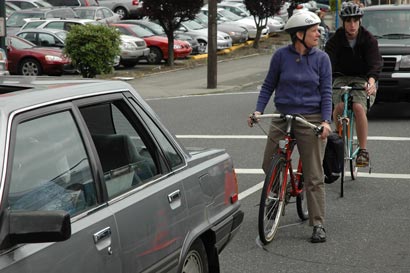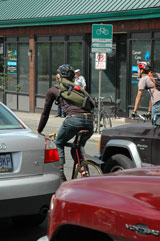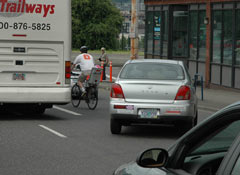[This article has been written by BikePortland.org columnist Elly Blue]

(Photos © Jonathan Maus)
Responses to the tragic deaths of cyclists this year have been by and large constructive. A law aimed at protecting vulnerable roadway users was passed and, more recently, thanks to the leadership of Commissioner Adams, a dialogue about improving intersection design appears to be really going places.
“Until cyclists are seen as equal users of the road, not as scofflaws, miscreants, and frivolous leisure riders, bicyclists will continue to be an easy target, a symbol and scapegoat for the confusion and fear people feel on the roads.”
–Elly Blue
If there is a silver lining to these dark events, it’s that new communication channels are being forged and ideas for positive change are being seriously discussed.
But there have also been less positive responses, ranging from pathologically vicious to simply uninformed. Rumblings of the latter quality are starting to be heard more and more often about bicycle licensing. I’d like to nip these in the bud. Right now.
Yes, we should all be concerned about the lack of skill and knowledge that’s painfully visible among the increasing flow of cyclists out there. And yes, even the most experienced among us have something more to learn about the complex task of navigating our roadways.
But the idea of licensing bike riders carries a petty, punitive undercurrent. Like a recently proposed change to bike lane laws, licensing is a proposal aimed at keeping bicyclists in the margins of the road and the law rather than continuing to integrate us.
The only effect of licensing bicycles would be its intended one — criminalizing bicycling and crushing the rise of a healthy, sustainable, safe mode of travel that more and more people are choosing.
Most cyclists already have been through driver training and licensing. And it does us just about as much good as it seems to do most people driving cars out there. Until the DMV is more effective at teaching road skills to drivers, we should be reluctant to broaden their scope to bikes. We can do it better, and cheaper, ourselves.

And until cyclists are seen as equal users of the road, not as scofflaws, miscreants, and frivolous leisure riders, bicyclists will continue to be an easy target, a symbol and scapegoat for the confusion and fear people feel on the roads.
As Jeff Mapes pointed out in an excellent editorial in last Sunday’s Oregonian, the number of people who die in traffic crashes each year in the US would fill two jumbo jetliners a week — and where is public outrage? It’s focused on bicyclists, not on people driving cars, who are equally undereducated and prone to human error, and to much more horrific effect.
Motorist education and licensing as they exist are not serving to keep our roads adequately safe and orderly. The bicycle community owes it to ourselves, and to all the new cyclists who we’ve helped inspire — and to all users of the road, whether pedestrians, drivers, or other cyclists — to do what we can to educate each other to keep ourselves as much as possible out of harm’s way.
Skillful, safe cycling is not a perfect correlation with legal cycling. And bicycle skills are not just about avoiding the physical dangers posed by sharing the road with cars and other cyclists — we should also know how to ride in a way that minimizes road rage, frustration, and just plain inconsiderateness.
Efforts are already being made, and some great resources are available. A group on the Shift email list have done some research and compiled all the bicycle education resources we could find available in Portland, and some resources for drivers as well.

Our list of resources so far shows many opportunities, and some glaring needs, for action and involvement.
How do we get more certified bicycling instructors out there, and how do we attract people to classes and workshops?
Are we doing enough to teach people who show up to group rides how to share the road with cyclists, pedestrians, and drivers?
How do we disseminate the already existing printed materials? Are they at all bike shops, schools, and other places where bicyclists go?
How do we get the community talking about bicycle safety and skills beyond just legal issues and how do we reach out to bring more cyclists into the dialogue?
Do we need more printed materials? Would a bicycling skills page here on bikeportland.org be useful?
Are there other resources out there that we’ve missed?
I consider myself an experienced cyclist, but I plan to spend some time today re-reading some of these resources. I’m thinking about taking a class to keep my skills sharp. It’s a complicated art, being out there on the road, and the stakes are too high not to be the best drivers and cyclists we can be.

